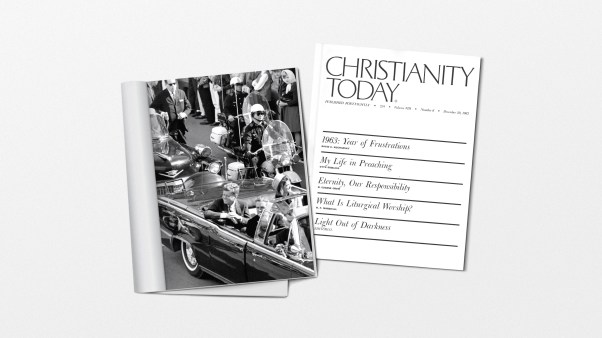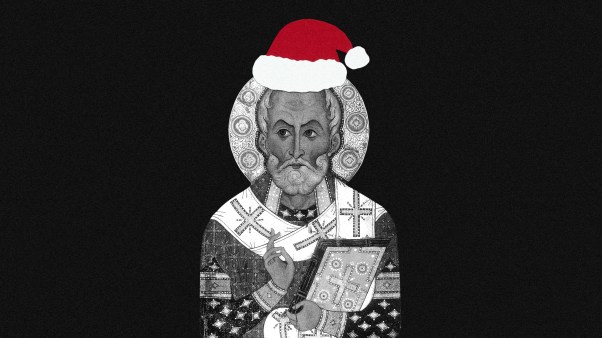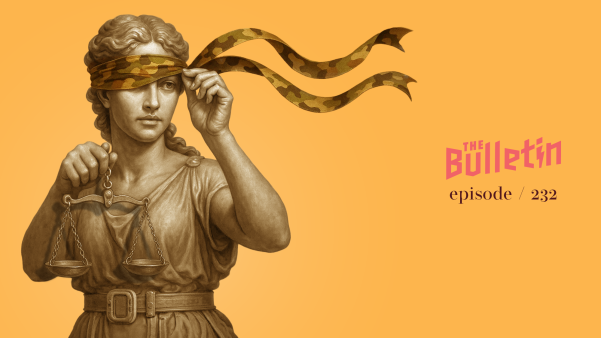Catholic doctrine according to Jesuit theologian Avery Dulles
There are cultural differences between Roman Catholic and Protestant Christians, but “the” difference, in the minds of most practicing Protestants, is doctrinal. Inquiring into what Catholics believe can be bewildering, what with centuries of traditions, councils, encyclicals, and so on.
Although no single theologian speaks for the entire Catholic church, an able guide is Fr. Avery Dulles, professor of theology at the Catholic University of America (Washington, D.C.). Father Dulles did doctoral studies in dogmatic theology at the Gregorian University (in Rome) and has written several acclaimed books (including Models of the Church and Models of Revelation). Generally considered a moderate theologian, he is past-president of the Catholic Theological Society of America. He is also experienced in communicating Catholic theology to non-Catholics. He has been a visiting lecturer at Presbyterian, Lutheran, and Episcopal seminaries, and has long been active in ecumenical dialogues.
Father Dulles was at the University of Dubuque Theological Seminary for another dialogue last March. In between public dialogues, CHRISTIANITY TODAY joined Father Dulles and his dialogue partner, Dubuque professor and noted evangelical theologian Donald Bloesch, for a discussion of the central doctrinal issues.
I. Papal Infallibility
The doctrine of papal infallibility is one of the main obstacles to a Protestant rapprochement with the Roman Catholic Church. Exactly how would you, as a Catholic theologian, describe this doctrine?
If somebody asked me to say in one word whether or not the pope is infallible, I would say no. To be infallible is to be incapable of falling into error. The pope can fall into error on all sorts of things, so saying the pope is infallible is a poor way of phrasing it.
Now, what if you refine the issue? What if you ask, “Are there any circumstances under which the teaching of the pope can be relied upon to be fully in line with the gospel?” Vatican I [1869–70] said that the pope can be relied upon when he is solemnly defining a matter pertaining to the revelation of Christ, as contained in Scripture and tradition.
Perhaps we can agree that somehow God, through his grace, sees that the church as a whole does not fall away from the gospel. Christ said to those he commissioned to preach and baptize in his name, “I will be with you always, to the end of the age.” The Catholic thesis is that Christ is with the church throughout the ages, seeing that it does not fall away from the gospel.
Catholics see infallibility primarily in the church as a whole and secondarily in the church hierarchy as a whole—the bishops. Finally, we say that in certain exceptional situations the pope, as head of the body of the bishops, can act for the whole episcopate. But even in Catholic theology there’s not total agreement on when it is appropriate or possible for the pope to speak for the whole episcopate without consulting it. It would be a total departure from tradition if the pope were suddenly to proclaim a dogma that was not accepted, with virtual unanimity, by the Catholic bishops.
You’ve made some significant qualifications about using the language of infallibility. In the Catholic understanding, can it be said that a pope ever speaks for God?
Only in the case of an infallibly proclaimed dogma do you have the fullest assurance that the pope is expressing the revelation of God. That is a very rare case. Few popes speak infallibly, ex cathedra.
In the normal case, the pope’s authority is similar to that of any pastor or bishop. I would guess most Protestant Christians believe that their pastors help them hear and understand the Word of God. If they do have some doubts about the pastor’s interpretation, they look for supporting evidence. They ask themselves whether or not they find it confirmed by Scripture or the confessional documents of the church, whether or not it makes sense to them in their lives, and whether or not fellow Christians are accepting it as the Word of God. These questions arise in regard to the pope as in regard to any bishop or pastor.
You seem to be saying that much of what the pope and magisterium say is a kind of pastoral advice or guidance. How do we distinguish between pastoral shepherding and infallible statements that all faithful Catholics should adhere to?
The documents themselves are pretty clear. Vatican Council II [1962–65], for example, said that its statements are not infallible unless the council makes it very clear that they are imposing something as infallible doctrine. It made no statements that it declared infallible, so the council produced some 700 pages of documents without a single infallible statement (except for quotation of previously accepted infallible doctrine).
Ii. The Assumption Of Mary
Two other difficulties Protestants have with Roman Catholicism concern the doctrines about Mary: the Assumption and the Immaculate Conception. Let’s begin with the Assumption, the doctrine that Mary was taken up to heaven following her death. How would you describe this doctrine?
The dogma of the Assumption has at least a thousand years of rather unanimous church tradition behind it. Although not in exactly the same terms, it has been believed in the Eastern as well as in the Western church. Essentially, it means that Mary is already in glory with Christ and that her glory is that of a full human person. It does not necessarily—at least as generally interpreted by contemporary theologians—mean there is no body in Mary’s tomb.
Exactly what might the historical event of the Assumption have been if it does not entail the bodily, physical presence of Mary in heaven?
It would imply some full personal existence. But there is plenty of speculation and unclarity about what happens to the dead who die in the Lord. Can human beings function as separated souls without any material element, or is it simply the nature of the human being to be an embodied soul? If you’re going to hold that dead Christians are in the blessedness of eternity now, at least some theologians think that they must have some kind of corporeal existence. [Catholic theologian] Hans Urs von Balthasar suggests that dead Christians are somehow incorporated into the risen body of Christ. But that does not require that their ashes or other remains be transported to some heavenly place.
The Assumption has been described as a special revelation of what happens to every Christian at death. Are you suggesting something similar?
To me that has some plausibility to it. It makes the dogma of the Assumption more comprehensible than it would if you imagined Mary’s body leaving the tomb and being transported through the skies.
Then would Mary’s incorporation differ in some way from that of any other deceased person who died in Christ?
No. At least it’s not evident that it would.
On that view, how does Mary differ in significance from other biblical characters, say Martha or Mary Magdalene?
She has a very special proximity to her son. We believe in Mary’s motherhood as being more than a merely physical motherhood. It is a motherhood in faith, an acceptance of the message of the Annunciation. Mary’s consent to the Holy Spirit was very intimately connected with the salvation of the world itself. Her consent was the condition that made possible the salvation that we enjoy.
So we see her very closely united to the mystery of Christ. Undoubtedly, Mary prays for the church on earth. Because of her proximity to Christ, we believe Mary’s prayers have a special efficacy.
Might not Mary’s assent to the Holy Spirit be better understood as an instrument of the Incarnation than a condition of the Incarnation? Reformed Christians, at least, would want to say Mary was an instrument of God’s electing grace, a sign of the Incarnation rather than a cause of it.
Certainly Mary was not a cause of the Incarnation. But if Mary had said no, it probably wouldn’t have happened.
If we believe in irresistible grace, Mary could only have said yes.
I think God knew she was going to say yes.
Iii. The Immaculate Conception
What about the Immaculate Conception, the doctrine that Mary was conceived without the taint of original sin?
The Immaculate Conception is a still more complicated dogma. It really affirms that Mary, from the point of conception in her mother’s womb, was sanctified by the grace of Christ. She never really contracted original sin, though she was subject to it in the sense that she had to be redeemed from it by the prevenient grace of God.
Now, nobody would claim either of these Marian dogmas was directly founded in Scripture. But indirectly it could perhaps be worked out in terms of the holiness and the closeness to Christ that the Scriptures ascribe to Mary.
Protestants are uncomfortable with the description of Mary as a co-Redeemer, and there is speculation that this might be declared a dogma of the church. Do you want to speak to that?
That is not likely to happen. Vatican II repeatedly said that Christ is our only Redeemer.
But if it were defined as dogma, it would have to be interpreted as meaning that Christ is active through Mary, that her sufferings and prayers are effective through Christ. It would only be a very subordinate, derivative kind of redemptive activity. Christ gives it all the efficacy that it has.
As Paul says, “I make up in my body what is lacking in the sufferings of Christ” [Col. 1:24]. Of course, that’s a somewhat difficult passage, but there does seem to be a claim on Paul’s part that his sufferings are somehow taken up into those of Christ. They have a redemptive efficacy: not alongside of Christ, but with Christ working through Paul as a member of the body.
This is a rather blunt way of asking the question, but it may help us to go a bit further on the subject: Would you be happy with a Christianity that held no special esteem for Mary?
A matter of devotion can’t really be legislated. Catholic individuals are very free. It is their decision whether or not they pray to the saints at all, or to which saints they will pray. So I can imagine a Christianity that did not particularly cultivate devotion to Mary. It could be in its way very authentic.
With prayers directly to God?
One certainly can pray directly to the triune God. It isn’t necessary to pray through the saints. Praying to Mary is a particular form of devotion that we think is pleasing to God, but it is not necessary. Provided that one did not reject devotion to Mary and the saints as idolatrous, we could accept a Christianity that practiced a different, purely theocentric or Christocentric form of piety.
Iv. Purgatory
Purgatory is another matter of difference between Protestants and Catholics. What is the current Catholic understanding of that doctrine?
Although it is not specifically taught in Scripture, purgatory is a very ancient belief. It appears in conjunction with the old Christian practice of praying for the deceased. Catholics believe that even those who die in the Lord may not as yet be fully disposed to enter into the joy of heavenly glory. They may have sinful dispositions or affections that still have to be purged.
Now this, as I say, is not explicitly taught in Scripture, but once the practice of praying for the dead is established, there are indications in Scripture that point that direction.
What would some of those be?
The principal text that’s used is one that does not appear in Protestant Bibles. It is 2 Maccabees 12:45, which says it is a holy and wholesome thought to pray for the dead that they may be released from their sins. In the New Testament, there are a few passages that could be interpreted as suggesting something like purgatory. One that comes to mind would be 1 Corinthians 3:12–15, which speaks of individuals being saved, as it were, through fire.
Protestants often point to the thief on the cross, who was told by Jesus, “Today you will be with me in Paradise.” From this passage, it appears that a simple act of faith is sufficient to bring one into heaven.
We certainly don’t hold that everybody necessarily goes to purgatory. It’s a question of the disposition with which one dies. Possibly the contrition of the thief, especially considering the suffering of crucifixion, might have done for him in this life what purgatory would otherwise do.
V. Scripture And Tradition
You’ve often referred to tradition. Protestants, as you well know, are concerned about the Catholic understanding of tradition and its relation to Holy Scripture. Would you elaborate?
The most basic notion of tradition is that it is the transmission of the gospel in the church. That transmission does not have to be only by means of reading a Book. The gospel has always been preached as pastors and communities understood it, with adaptation and changes of language. A certain amount of interpretation goes into it, and has down through the centuries. As a matter of fact, most Christians, even evangelical Christians, get their gospel through tradition in that sense of the word.
The Catholic interpretation of Scripture depends upon a theological tradition (a tradition nourished by prayer and piety) that has developed over many centuries. In some instances, it has gotten rather far away from the letter of Scripture. But the principle that Scripture is transmitted through tradition enjoys a rather wide consensus today between Protestants and Catholics.
Of course, you do need some criteria to separate good tradition from distorting tradition. Catholics generally rely very heavily on the magisterium, the teaching office of the pope and the bishops.
There probably wouldn’t be much disagreement about tradition as a process that envelops all Christians, whatever their persuasion. But do Catholics have, in a sense, tradition with a capital T, tradition that is not part of the process of handing down the faith, but is a finished deposit that stands on a par with or above the authority of Scripture?
The councils have said that Scripture and tradition have equal dignity and authority. But that does not mean that there are any truths that are known by tradition alone. Whether there are or are not such truths is disputed among Catholics today.
There was a period, from about 1600 to 1950, when most people thought the Catholic position was that there are certain truths that are known by tradition alone. These were thought to be conveyed by word of mouth from the apostles onward. Today that would be a minority view. Vatican II went out of its way to say that Scripture and tradition never stand by themselves alone, but that all Christian truth is known by tradition and Scripture together. Tradition is perhaps best understood as clarifying and interpreting what is already in Scripture.
That’s helpful. Still, it seems hard to avoid the fact that there are two sources of revelation in the Catholic church, tradition and Scripture. You’ve indicated that dogmas such as the Assumption of Mary and her Immaculate Conception really rest on tradition more than on Scripture.
Yes, but Vatican II avoided saying that there are two sources of revelation. What it said in its “Constitution on Divine Revelation” was that Scripture and tradition are inseparable. The church reads Scripture in the light of tradition. And a certain reading of Scripture in the light of tradition gives a deeper sense of the realities that are talked about in Scripture. It’s in this way that doctrine develops.
That sounds distinctly different from a Protestant approach. We would be more prone to speak of interpreting tradition in light of Scripture.
I wouldn’t press the difference too far, because the same is true to some extent for Catholics. We attempt to understand the meaning of Scripture better in the light of tradition. And we revise the formulation of doctrine in the light of a better understanding of Scripture. It works both directions.
Vi. Justification By Faith
Having gained some grounding in your understanding of the magisterium, tradition, and the general approach to doctrine, we can now consider our most basic difference: the doctrine of justification by faith through grace. How far apart on this doctrine are contemporary Catholics and Protestants?
I would say that really we do not greatly disagree on the way in which the individual comes to justification: through the grace of Christ accepted in faith. That’s pretty much common doctrine between our churches, even though it has not been recognized as common doctrine. Many Catholics are astonished to hear this—they think that Catholics are justified by their good works. But that has never been Catholic teaching.
That would be a surprise to many people, and not just Catholics. Please elaborate.
The response to Luther was made official at the Council of Trent [1545–63]. In its “Decree on Justification,” the council described the process of justification and insisted that it is through faith that one is justified.
One is first freely justified by the grace of God, and then one is held to live up to the faith that one professes. Works will follow in the life of a believer. If they flow from faith, they are good in the sight of God and will be rewarded.
That we will be rewarded according to our works is said a number of times in Scripture [see Matt. 16:27, 1 Cor. 3:8, and 2 Cor. 9:6]. So the heavenly rewards do depend somewhat upon the good works that we have been able to perform in the flesh, in this life. But those good works presuppose faith.
It’s interesting that you spoke of the “process” of justification. Protestants think justification is like being pregnant: you either are or you are not.
Catholics believe you either are or are not, but there is normally a gradual preparation for justification, and after you are justified you can be more justified still. It’s partly a question of terminology. Most Catholics and Protestants distinguish between justification and sanctification. In Catholic theology, the increase of justification is commonly called sanctification, and thus there are degrees of sanctification. I guess what you’re really asking about is sanctification.
In Reformation theology, sanctification and justification are described as two separate works of grace. Justification is the foundation, an external imputation of righteousness to the sinner who has faith in Christ. Sanctification is the inward purification of that person. The Reformers were adamant about the two not being confused.
There may be something of a difference, then, between evangelicals and Catholics. We maintain that justification is not simply extrinsic. It originates outside but is received in us, so we are not only reputed just but are made really just or righteous. There is an inner transformation in justification itself. That inner change could also be called sanctification. Thus justification and sanctification, for Catholics, are really inseparable.
We’ve made some distinctions about the words justification and sanctification. What does the word faith mean to an informed Catholic?
There are different Catholic understandings of faith. In medieval scholasticism and up to recent times, faith was commonly understood as an intellectual act of belief. It was contrasted with hope and love, which had more to do with the will than with the intellect.
But one can also understand faith in a more global or inclusive way: faith as a loving, trusting commitment of one’s whole self to God. That is the sense of the term as it was used in Vatican II. If you understand faith in that broad sense, then you can use an expression like “justification by faith.”
But this is an expression used more by Protestants than Catholics. Catholics look to the distinction Paul makes in 1 Corinthians 13 between faith, hope, and love. He says the greatest of these is love, and that if you do not have love, even a faith that can move mountains will profit nothing.
Protestants, too, would say that love is the crown of faith. But faith is the foundation. We first have faith and then we do works of love to demonstrate our faith.
We wouldn’t have any disagreement there. The Council of Trent said that faith is the root and foundation of all justification. So faith is a necessary element but, understood strictly as a matter of intellectual belief, it is not sufficient. There must be an accompanying hope and love.
And of course, Protestants have a centuries-old rallying cry: justification by faith alone. It appears that whether or not a Catholic can accept that dictum depends on the understanding of the term faith. If we define faith in the broad sense, as the commitment of the entire self to God, could you affirm justification by faith alone?
It could be said that faith itself is intrinsically characterized by love. As I mentioned, Vatican II speaks of faith as a loving obedience, and in that sense you could say faith alone is sufficent to justify.
Let’s backtrack again, to the idea of reward. How does the Catholic tradition of merit relate to justification?
Only those who have been freely justified by God’s grace are in a position to merit. We do not merit justification, but having been justified or made righteous in God’s sight, by his favor and grace, we are in a position to perform good works—and those good works will be rewarded. This is indicated in the New Testament many times. Catholics believe there are degrees of glory, which depend upon how one has responded to grace.
Would you say that we do not merit the first grace that comes to us, but we can merit salvation, the final grace?
I was going to say yes. But when you said “final grace” I hesitated, because there is a thesis of Saint Augustine that the grace of final perseverance cannot be merited. It’s a special gift of God and we really cannot control whether we will die in God’s favor or not. But with that reservation I would say yes, we can merit salvation provided that we persevere in grace.
Again we need to examine the meaning of our terms. When Catholics speak of salvation, they are thinking of the end of a process. When Protestants use the word salvation we tend to think of it as something accomplished when the believer accepts Christ as Savior and Lord. We can also recognize the life of faith as a process, as sanctification, and in that sense the Christian is being saved at present and will be saved in the future. Yet the evangelical Protestant would not like to associate merit with any of these stages. There will be rewards, but instead of being based on merit, they will depend on God and the mystery of his providence.
I don’t see any sharp difference between us. The Council of Trent did say, quoting Augustine, that in rewarding our merits God crowns his own gifts. So it really is a meriting from grace: Only because of God’s gifts can we merit at all. The word merit is always used with reservation in theology.
With careful qualifications, then, you would say that Christians merit salvation. In what sense would or would not a Catholic speak of being saved at this moment, before death or the end of the faith journey?
We thank God for having put us on the path that leads to final salvation, but we do not boast that we’ve already been saved in the sense that we can’t be lost. That would lead to a wrong attitude before God. We are always conscious of our sinfulness, which makes it possible for us to fall away.
So we hope we will be saved. It is a firm and confident hope, not a mere wish. Saint Thomas [Aquinas] and others understand hope to include an assurance, though it is not an absolute assurance. There is the possibility of resisting God’s grace. He does not treat us as automatons, but regards us as free people who could turn away and reject his love. As Paul says, we work out our salvation in fear and trembling [Phil. 2:12].
But at the same time, we do believe in a God who is merciful and powerful so that those who trust in him will never be put to shame, as the psalm says [Ps. 31:1]. Thus, we move ahead peacefully and joyfully, with a sense of God’s loving providence over us.










